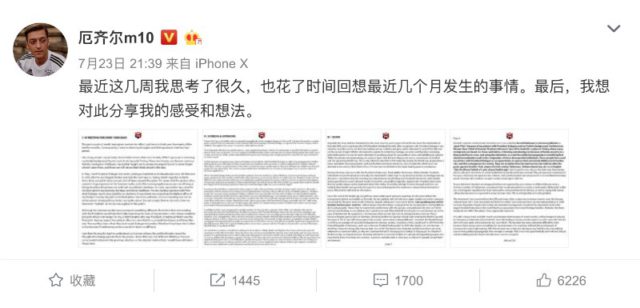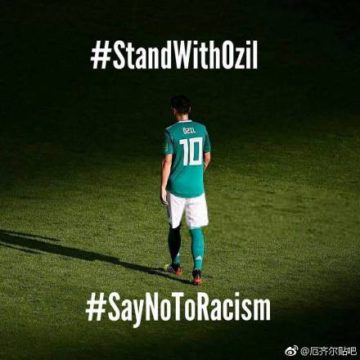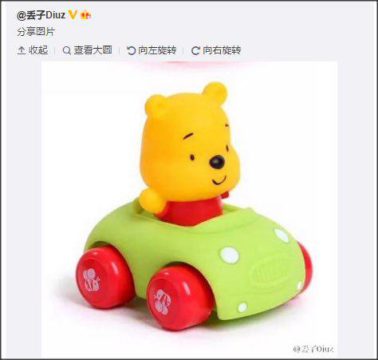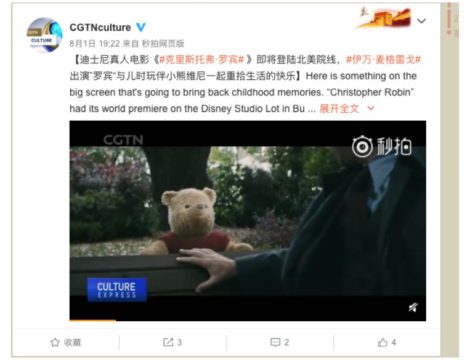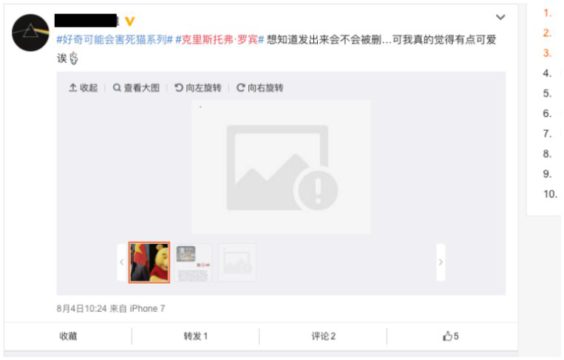Skinny girls that eat a week’s worth of food in one sitting: Chinese binge-eating vloggers are all the rage recently. But behind their cute image and happy fans, there are darker online discussions tying them to self-induced vomiting – something that is promoted in China’s so-called ‘vomit bars.’ How innocuous is this social media extreme-eating trend?
Mimi Zhang (aka Mizi Jun 密子君) has over seven million fans on her Weibo page. She regularly hits the top trending lists on Chinese social media, and even has her own online fanclubs.
Unlike previous rising Chinese social media stars such as Papi Jiang, the 26-year-old Mimi from Chongqing did not become an online celebrity because of her comic skills or acting talent, nor for her singing voice or dance moves. Mimi Zhang became famous for eating 8 lb (4 kg) of rice in one sitting, during an eating challenge in 2016.
![]()
Mimi eating 8lb (4 kg) of rice in one sitting.
By now, Mimi is one of China’s most successful ‘Eating Broadcasting’ hosts. Also called ‘Big Stomach Star Eating Livestream’ (大胃王吃播) or ‘Livestream Eating Vlogging’ (吃播女博主) in China, it is an online video genre in which hosts will consume extremely large amounts of food.
![]()
BJ The Diva during one of her livestreams.
In South Korea, it is known as the ‘mukbang‘ phenomenon, and the craze started there some years earlier, peaking in 2016. ‘Eating Broadcasting’ stars such as Kinoshita Yuka (video) and BJ The Diva (video) already had their moments of fame on the internet in South Korea, Japan, and beyond, but the genre only recently has become a real hype on Chinese social media.
Binging on Camera
Looking at the number of views and subscribers from YouTube to Twitch, or on platforms such as Kuaishou or Douyin, the ‘Eating Broadcasting’ genre obviously has millions of fans worldwide.
This online movement is innocuous in many ways. According to experts, people enjoy watching others eat because they feel a social connection, or want to stimulate their own appetite – it is one of the reasons why the craze is also dubbed ‘social eating.’
For many, the genre is simply entertaining; hosts often eat unconventional dishes, they are descriptive with taste, play around with their expressions, take on challenges, talk, and make funny sounds while eating.
![]()
Chinese food vlogger Duoyi (大胃王朵一) eats some skewers…
But what if ‘social eating’ becomes ‘binge eating’? How harmless is the genre if it shows skinny women eating excessive amounts of food, inadvertently promoting unhealthy eating habits and unrealistic standards?
![]()
Extreme binging on camera: eating noodles- not from a bowl, but from the back of a delivery car.
Along with Mimi Zhang, ‘Big Stomach Mini'(@大胃mini) is one other among many Chinese livestreamers that has achieved online stardom by eating large amounts of food. The 24-year-old reportedly is 1,70 m. tall and only weights 47 kilograms (103lbs), yet recently managed to eat a staggering 17 kg (35 pounds) of meat (video).
![]()
‘Big Stomach Mimi’
More and more, netizens are starting to connect these live-streamers to a habit of purging. Ongoing rumors suggest a supposed connection between binge streaming and vomiting.
Recently, various accounts claimed that Mimi Zhang used to have an account (using the name ‘Little Mi 360’ 小密360) on an online forum where people, mainly women, encourage each other to binge and purge.
China’s “Vomit Bar” (催吐吧) Community
China’s so-called “Vomit Bars” (催吐吧), online forums focused on binging and purging, have formed a hidden community on Chinese internet for years.
The phenomenon already came to light in 2012, and started to receive news media attention within China in 2015 and 2016. Most of the bigger online forums got shut down in 2017, however, after rumors circulated that a member of a ‘Vomit Bar’ had reached such a low weight that her organs failed and she passed away.
![]()
Example post from a ‘vomit bar’: 158 cm tall and 37 kg weight, but still wanting to lose.
Nevertheless, the online community consists of thousands of people, mainly women aged 14-40. A previously well-known forum on Baidu (now shutdown) had around 50,000 members called ‘rabbits’ (兔子) and over 5,5 million posts.
![]()
A “Vomit Bar” forum.
Since then, there are still some scattered forums, and a special Android app called ‘Meet Like Rabbits’ (相识于吐), where users can share their experiences and tips on message boards. On WeChat’s group chats, members of the community have more freedom to talk in private with less risk of being shut down.
![]()
The app for online purging community.
Members of the online ‘purging community’ are called ‘rabbits’ since the Chinese word for rabbit, tuzi (兔子), sounds similar to the word for ‘purging’ (tu 吐), and also because they eat all day, just like rabbits.
The main goal of these online forums is to share tips and tricks on how to lose weight by purging, while still binging on food. People also post photos of their binges or body, and share their hopes and fears in losing weight. “The way it is now, I could maintain a weight of around 46 kilograms,” one ‘rabbit’ writes: “I think it’s fat. My heart is filled with panic. I can only vomit.”
![]()
Netizens taking part in the ‘vomit bar’ community sharing photos of their binge food.
Newcomers ask others about best ways to vomit, and some people who say they’ve been binging and purging for years share experiences about their painful stomach and tooth decay.
Doctor Ma Yongchun (马永春) from Zhejiang Tongde Hospital since long has been warning people that these kind of online forums are harmful. She told iFeng news that the so-called ‘rabbits’ get caught up in a vicious cycle of binging and purging, and in doing so are developing serious eating disorders that can become life-threatening.
Eating Disorders in China
The Chinese ‘rabbit’ community could perhaps be compared to the Western ‘pro-ana‘ phenomenon, an online movement where people promote the behavior related to the eating disorder anorexia nervosa.
But there is one major difference; the ‘pro-ana’ community is connected to the term ‘anorexia’, suggesting that users of such forums are somewhat aware their behaviors are a sign of an actual eating disorder.
In these Chinese online communities, however, there seems to be a lesser acknowledgment that the cycle of binging and purging is one that belongs in the realm of a psychological disorder. Although people do complain that they feel they can no longer stop their irregular eating pattern, they talk more about their stomach aches and ulcers than they actually talk about suffering from an eating disorder.
This perhaps relates to the fact that there is little general awareness about eating disorders (ED) in China. Although there are no official statistics on the occurrence of bulimia, anorexia, or other ED in China, previous studies have found levels similar to Western countries (Tong et al 2014).
What various studies over the past years have also established is that there are major differences between Western countries and China in how eating disorders manifest themselves, suggesting they are not culture-bound but culture-reactive (Getz 2014, 749; Pike & Dunne 2015).
Because EDs are (1) traditionally conceptualized as a “Western mental health issue,” because (2) there is a social stigma attached to mental health issues in general in Chinese society, because (3) there is little general awareness on EDs, because (4) there is a lack in Chinese healthcare facilities specialized in EDs, and because of (5) various cultural factors (e.g. a very strong food culture), Chinese patients are more prone to talk about their problems in the form of somatic symptoms such as an extreme (dis)taste for food or abdominal problems, than in the form of a psychological problem (Getz 2014, 746-750).
Growing Awareness?
Recently, Chinese media slowly seem to be promoting more awareness on eating disorders. The American video “I became Anorexic for Instagram” has gone viral on Chinese social media over the past month, as it was posted by various state media channels on Weibo.
Among thousands of reactions, many said: “It seems that this kind of disease doesn’t occur much in China – we have too many tasty food!” Others said: “I want to lose weight too – I want an eating disorder like this!”
But there are also more and more people who are tying the rise of China’s online unhealthy eating trends to more serious issues. “These girls who eat so much [on camera] do not just have big stomachs, they actually puke in order to eat so much. I don’t find it entertaining to watch them anymore,” one netizen (@有兔劳劳) says.
“I now find it sad to watch these ‘big stomach stars’ (大胃王),” another person says: “They definitely vomit – it’s impossible for one person’s stomach to hold so much food.”
“What’s up with all these ‘big stomach stars’ recently? It’s not something they were born with, or something they were trained in doing; they are like those ‘rabbits’ and it is a disease, it’s bulimic. I don’t want to support them anymore by watching how they harm themselves,” another commenter writes.
![]()
Meanwhile, China’s binge-eating online stars seem to be unaffected by the online rumors that connect them to unhealthy trends and eating disorders.
This week, Mimi Zhang has posted her latest video in which she finishes a total of 15 desserts, while ‘Big Stomach Mini’ has posted a new video in which she eats, amongst others, 250 skewers of meat.
For some commenters, there is no issue at all: “She just has a great appetite.”
Are you suffering from an eating disorder and need help? For information on eating disorders and how to help if you are worried about someone, Beat (UK) or ANAD (US) has advice for sufferers, friends and family.
By Manya Koetse
References (online references linked to in text)
Getz, M.J. 2014. “The Myth of Chinese Barbies: Eating Disorders in China including Hong Kong.” Journal of Psychiatric and Mental Health Nursing 21: 746-754.
Pike, Kathleen M., and Patricia E. Dunne. 2015. “The Rise of Eating Disorders in Asia: a Review.” Journal of Eating Disorders 3:33. Available online https://jeatdisord.biomedcentral.com/articles/10.1186/s40337-015-0070-2 [17.1.18].
Tong, J., Miao, S., Wang, J. et al. 2014. “A Two-stage Epidemiologic Study on Prevalence of Eating Disorders in Female University Students in Wuhan, China.” Social Psychiatry and Psychiatric Epidemiology 49(3): 499-505.
Directly support Manya Koetse. By supporting this author you make future articles possible and help the maintenance and independence of this site. Donate directly through Paypal here. Also check out the What’s on Weibo donations page for donations through creditcard & WeChat and for more information.
Spotted a mistake or want to add something? Please let us know in comments below or email us.
©2018 Whatsonweibo. All rights reserved. Do not reproduce our content without permission – you can contact us at info@whatsonweibo.com.
The post Binging and Purging as Online Trend: From China’s “Big Stomach Stars” to “Vomit Bars” appeared first on What's on Weibo.













